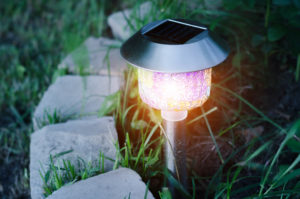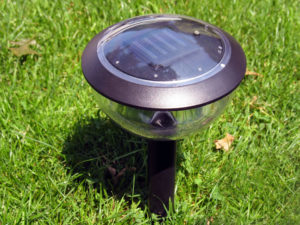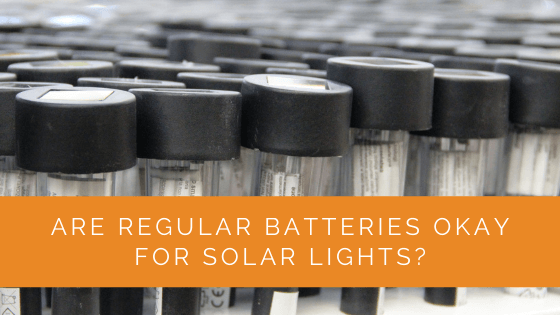There are many different types of solar lights on the market, but one question that often comes up is “are regular batteries okay for these?” The short answer is that no; however, for very brief periods (a week or less), alkaline batteries may be used in solar lights.
Contents
- 1 Key Takeaways
- 2 What’s The Average Lifespan Of Solar Light Batteries?
- 3 What Type of Batteries are used in Solar Lights?
- 4 Are Solar Light Batteries Different From Regular Batteries?
- 5 Rechargeable Batteries Versus Alkaline Batteries for Solar Lights
- 6 What are NiCd (Nickel Cadmium) rechargeable batteries?
- 7 What are NiMH (Nickel Metal Hydride) Batteries?
- 8 What Battery is Better? NiCd (Nickel Cadmium) or NiMH (Nickel Metal Hydride)?
- 9 How Long Do Rechargeable Batteries Last in Solar Lights?
- 10 How Do You Know Your Rechargeable Batteries Are Dead?
- 11 How Do You Extend The Lifespan Of Rechargeable Batteries?
- 12 Can You Replace the Batteries in Solar Lights?
- 13 How Do You Replace the Batteries in Solar Lights?
- 14 How Do You Charge Brand New Solar Lights?
- 15 Case Study: Ensuring Optimal Battery Use in Solar Lights
- 16 Expert Insights From Our Solar Panel Installers About Regular Batteries for Solar Lights
- 17 Our Expertise in Solar Lights
- 18 Conclusion
Key Takeaways
- Regular alkaline batteries should not be used in solar lights for prolonged periods; they may work briefly for a week or less but are not suitable for long-term use.
- Solar lights typically use special iron-nickel or alkaline batteries, and using other types of batteries can reduce their effectiveness or damage the lights.
- Rechargeable batteries like NiCd and NiMH are good options for solar lights, offering longer lifespans and more power, but proper care and storage are essential to maximize their lifespan.
What’s The Average Lifespan Of Solar Light Batteries?
The average lifespan of a solar light battery is around two years. This may vary depending on the brand and quality of the battery, as well as how often the light is used.
Many factors can affect a solar light’s battery life, such as its location (whether it’s in direct sunlight or not), the weather conditions, and the age of the battery. Generally speaking, though, you should expect to get around two years of use from a solar light battery.
If your solar lights aren’t working properly, it may be because their batteries need to be replaced. You can buy replacement batteries online or at most hardware stores. Be sure to check the size and type of battery your solar lights require before purchasing a replacement.
What Type of Batteries are used in Solar Lights?
Solar lights require a special type of battery called an “iron-nickel” or “alkaline” battery. Other types of batteries, such as “carbon-zinc” and “lithium,” will not work in solar lights for prolonged periods because they do not hold enough power to be effective.
If you put one of these other kinds of batteries into the light fixture, it may appear that the light is working properly when it’s just using up all its energy very quickly.
It is possible to use regular alkaline batteries in your solar lights if necessary – but only for a week or less at most. Using them longer than this can reduce their effectiveness over time and could even damage the light.
Purchasing replacement batteries online or at most hardware stores. Be sure to check the size and type of battery your solar lights require before purchasing a replacement.

Are Solar Light Batteries Different From Regular Batteries?
Solar light batteries are different from regular alkaline batteries in several ways. While most “alkaline” and “heavy-duty” types of alkaline batteries can be used outside, you should not use standard carbon-zinc or lithium-type batteries outdoors because they do not hold power well enough to work effectively in solar lights for very long.
They also have a lower voltage than iron-nickel (alkaline) batteries – 0.75 volts compared to the typical alkaline battery’s voltage level at around one volt. This is why it may appear that an installed solar light isn’t working when actually all its using up energy quickly before going out completely within minutes or hours instead of days like intended.
Solar light batteries also have a longer lifespan than regular alkaline batteries – around two years compared to the average lifespan of regular alkaline batteries, which is about one year.
Another difference between solar light and regular alkaline batteries is that solar light batteries are typically more expensive. This is because they are designed specifically for use in solar lights, whereas regular alkaline batteries can be used in a variety of devices.
Rechargeable Batteries Versus Alkaline Batteries for Solar Lights
Rechargeable batteries are a great option for solar lights, as they hold more power and can be used multiple times. However, they require an initial investment and need to be recharged regularly. Alkaline batteries, on the other hand, are less expensive but do not last as long or hold as much power as rechargeable batteries.
What are NiCd (Nickel Cadmium) rechargeable batteries?
Nickel-cadmium batteries, or NiCd batteries, are a type of rechargeable battery. They were one of the most common types of rechargeable battery before being replaced by nickel-metal-hydride (NiMH) and lithium ion (Li-ion) batteries.
NiCd batteries have a high energy density and can hold their charge for long periods, making them ideal for use in solar lights. However, they also have a relatively low power output and can be prone to memory effect – where the battery loses its ability to fully charge if it’s not regularly used.
If you’re looking for a replacement battery for your solar light, NiCd rechargeable batteries are a good option. They are widely available and can be used in a variety of devices, including solar lights.
What are NiMH (Nickel Metal Hydride) Batteries?
Nickel-metal-hydride batteries, or NiMH batteries, are a type of rechargeable battery. They are a newer technology than nickel-cadmium and have a higher power output. However, they also have a lower energy density than NiCd batteries, meaning that they cannot hold their charge as long.
NiMH batteries are less prone to memory effects than NiCd batteries and can be charged in shorter periods. If you’re looking for a replacement battery for your solar light, NiMH rechargeable batteries are an excellent option.
They are widely available and can be used in a variety of devices, including solar lights.

What Battery is Better? NiCd (Nickel Cadmium) or NiMH (Nickel Metal Hydride)?
When looking for a replacement battery, you need to consider how long the solar lights are expected to last and what is most convenient. If you’re only planning on using your solar light occasionally or have access to electricity that can be used as an alternative power source, then alkaline batteries may be best.
However, if you want your solar light to remain bright throughout its entire lifespan without having to worry about recharging it regularly or finding another way of powering it, NiCd rechargeable batteries are ideal.
NiMH batteries are also suitable because they have a higher power output than NiCd but lack some of the disadvantages associated with nickel-cadmium products such as the memory effect. This makes them more efficient in their use of energy and a good choice for solar lights.
Ultimately, it comes down to personal preference and what is most convenient for you. NiCd rechargeable batteries are widely available and can be used in a variety of devices, including solar lights, while NiMH batteries have the benefit of being less prone to memory effects. Whichever battery type you choose, make sure that it is designed specifically for use with solar lights, or else it may not work properly.
How Long Do Rechargeable Batteries Last in Solar Lights?
Rechargeable batteries may last anywhere from six months to three years. If you’re not using the solar light every day, they tend to hold their charge longer and need less frequent charging than when in constant use.
Batteries with a higher mAh (milli-Amp hour) rating will typically last for about twice as long before needing recharged*.
How Do You Know Your Rechargeable Batteries Are Dead?
Rechargeable batteries by design will gradually lose their charge over time. If you’re not using your solar light regularly, chances are that it may take a while to completely drain the battery and need recharging for use again.
However, if you find that your rechargeable batteries no longer hold any kind of charge at all when in storage or immediately after they have been charged up then there is likely something wrong with them.
You should replace them as soon as possible because this problem can also affect how well the solar light itself works once its power source is depleted too far.
How Do You Extend The Lifespan Of Rechargeable Batteries?
#1: Store Your Batteries Properly
Proper storage of rechargeable batteries is essential to maximizing their lifespan. If you can, store your lithium-ion and NiMH batteries at a temperature between 40 and 70 degrees Fahrenheit (between four and 21 Celsius) with about 50% charge in them.
This means that if the battery only has half of its charge left then you should ideally store it halfway between the fully charged level and empty.
However, ensure that your batteries are not stored at temperatures above 80 degrees Fahrenheit (26 Celsius) because this can cause them to age more quickly.
If they are stored too cold, the battery may lose some of its ability to hold a charge.
In addition, avoid dropping or shaking your batteries since this can damage the protective seal that helps to keep them from leaking acid and causing electrical short-circuits.
Finally, do not store your lithium-ion battery with a full charge for long periods because it may become unstable and pose a risk of fire or explosion.
If you do not use your solar light every day, make sure to check the battery level before storing it. This will help to preserve its charge and extend its lifespan.

#2: Don’t Fully Discharge The Battery
Leaving a battery discharged for an extended period of time can cause it to lose its ability to hold a charge. This is known as the “memory effect” and is more common in nickel-cadmium batteries than in nickel-metal-hydride products.
#3: Charge The Battery Appropriately
Rechargeable batteries should be charged slowly to extend their lifespan. Charging them too quickly can cause damage that will shorten the battery’s life.
In addition, overcharging a battery can also lead to decreased performance and shortened lifespan. A good way to avoid this is to use a smart charger, which will stop charging the battery when it’s full.
Can You Replace the Batteries in Solar Lights?
In some cases, you may be able to replace the batteries in solar lights without having to purchase an entirely new light fixture.
However, it’s important to check the manufacturer’s instructions first to see if this is a possibility. If so, then use caution when removing and installing the new battery as they are often very fragile.
How Do You Replace the Batteries in Solar Lights?
Replacing the batteries in solar lights is a relatively easy process. However, it’s important to take your time and be careful when handling the new battery.
Here are the basic steps:
- Remove the screws that hold the light cover in place
- Take off the cover and set it aside
- Disconnect any wires that may be attached to the old battery
- Remove the old battery by gently prying it out of its housing
- Install the new battery by lining up its posts with those on the housing and pushing until it snaps into place
- Reconnect any wires, replace the light cover, and reattach the screws
How Do You Charge Brand New Solar Lights?
If you have purchased a new solar light, it’s important to charge its batteries before using them. The process for doing this is similar to that of charging other rechargeable batteries and should be done in accordance with the instructions provided by the manufacturer.
In addition, if you do not plan on using your solar light immediately after receiving it then make sure that it has been stored properly so that its battery does not lose any power sitting idle over time.
Case Study: Ensuring Optimal Battery Use in Solar Lights
Background
At Solar Panels Network USA, we understand the critical role that batteries play in the performance and longevity of solar lights. A common query we receive is whether regular batteries can be used in solar lights. This case study explores our approach to educating customers on the proper use of batteries in solar lighting systems to maximize their effectiveness and lifespan.
Project Overview
A residential client contacted us with concerns about their solar lights not functioning correctly. They had been using regular alkaline batteries due to a shortage of recommended batteries. This temporary solution led to several issues, including reduced light performance and potential damage to the fixtures.
Implementation
Diagnosis and Initial Steps
Upon inspection, we discovered that the use of regular alkaline batteries was indeed the root cause of the problem. Alkaline batteries, while convenient, are not designed for the recharge cycles required by solar lights, leading to poor performance and potential damage.
Educating the Client
We explained to the client the importance of using the correct type of batteries. Solar lights typically require specific rechargeable batteries, such as Nickel-Cadmium (NiCd) or Nickel-Metal Hydride (NiMH), which are designed to withstand frequent charging and discharging cycles. These batteries not only enhance the performance of the lights but also extend their lifespan.
Replacement and Testing
We replaced the regular alkaline batteries with high-quality NiMH batteries, known for their higher power output and longer lifespan. The installation process included the following steps:
- Battery Removal Carefully removing the alkaline batteries from the solar light fixtures to prevent any potential damage.
- Installation of NiMH Batteries Installing the new NiMH batteries, ensuring they were properly aligned and securely in place.
- Functionality Testing Testing the solar lights to ensure they were functioning correctly with the new batteries. This included checking the charging efficiency during the day and the light output during the night.
Preventive Measures and Tips
We provided the client with guidelines for maintaining their solar lights and batteries:
- Regular Maintenance: Checking the batteries and solar panels regularly to ensure they are clean and free from obstructions.
- Proper Storage: Storing spare batteries in a cool, dry place to prevent degradation.
- Timely Replacement: Replacing batteries every two years or when performance noticeably declines.
Results
The replacement of alkaline batteries with NiMH batteries resulted in immediate improvement in the performance of the solar lights. The lights now operate efficiently, providing consistent illumination throughout the night. The client appreciated the enhanced brightness and reliability of their solar lighting system.
Summary
This case study highlights the importance of using the appropriate batteries in solar lights to ensure optimal performance and longevity. At Solar Panels Network USA, we are dedicated to providing expert guidance and solutions that help our clients maintain efficient and sustainable solar lighting systems. By educating customers on the correct use and maintenance of batteries, we help them achieve the best possible outcomes for their solar lighting needs.
Expert Insights From Our Solar Panel Installers About Regular Batteries for Solar Lights
Using regular alkaline batteries in solar lights can be a temporary fix, but it’s not recommended for long-term use. They can leak or damage the lights over time.
Senior Solar Technician
Solar lights are designed to work with specific types of rechargeable batteries like NiCd and NiMH. These batteries ensure optimal performance and longevity.
Lead Solar Installer
Proper maintenance, including regular checks and timely replacement of the batteries, is crucial for maintaining the efficiency and lifespan of your solar lights.
Solar Installation Specialist
Our Expertise in Solar Lights
At Solar Panels Network USA, we’re here to provide you with valuable information and support regarding solar lighting. With our experience and understanding of the solar lighting industry, our team of experts is prepared to assist you in finding the right lighting solution for your needs. Whether you’re interested in improving your outdoor spaces, conserving energy, or adopting a more sustainable approach, we’re well-equipped to help. Please feel free to contact us with any questions or inquiries.
Conclusion
There are a few things to keep in mind when it comes to using and caring for solar lights. By following the tips provided in this article, you can help ensure that your solar light lasts for many years to come. Thanks for reading!
About the Author
Solar Panels Network USA stands at the forefront of solar energy solutions, driven by a team of seasoned solar engineers and energy consultants. With over decades of experience in delivering high-quality solar installations and maintenance, we are committed to promoting sustainable energy through customer-centric, tailored solutions. Our articles reflect this commitment, crafted collaboratively by experts to provide accurate, up-to-date insights into solar technology, ensuring our readers are well-informed and empowered in their solar energy decisions.

